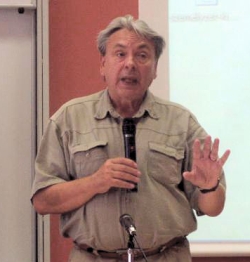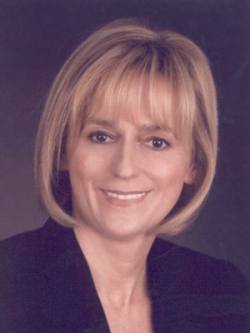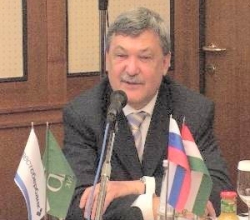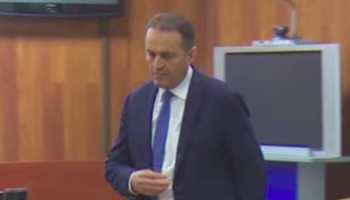f Geza Finszter„If there are 300 murders, you call the police,” said Geza Finszter, a senior researcher at the National Institute of Criminology in Budapest. „If there are 30,000 murders, you look for another solution. Real justice is only possible in a fundamentally honest society. Only then can you make crime unprofitable.”
Geza Finszter„If there are 300 murders, you call the police,” said Geza Finszter, a senior researcher at the National Institute of Criminology in Budapest. „If there are 30,000 murders, you look for another solution. Real justice is only possible in a fundamentally honest society. Only then can you make crime unprofitable.”
Hungary, by most standards, is not such a society. According to Transparency International’s 2008 report on corruption in business, top managers of a third of all companies say they regularly bribe politicians, and two-thirds of them have recently become targets of economic crime. Meanwhile, except for multinational companies and the public sector, nearly nobody pays taxes to the full and skirting regulations is the historical norm.
There seems to be little concerted effort to tackle the problem, Finszter added. The justice system is uninterested in a comprehensive review, let alone reform, she said. And all those involved avoid scrutiny.
“We tried to get a list of cases that were discontinued, and the reasons for dropping them,” Finszter added. “We found nothing but closed doors.”
Corruption Remains through Transition
What he and others say is that the country has remained corrupt throughout its structural transition. According to the Transparency International report, businesspeople think the situation has worsened in recent years. Corruption is the way of operating, not the exception, for most businesses. It defines success: a full three-quarters of people that actively engage in corruption are top-level managers in the business world.
An overview of high-profile cases in the last decades supports that assessment and shows names from the ranks of government and business, although such links remain unproven and those involved remain unpunished. BudapestPart of the problem is that the justice system has nowhere near the sophistication of the criminals, who are armed with specific technical knowledge and, as opposed to the ranks of investigators, have money, education, motivation, and a proper legal background. So, sector by sector, the justice systems fails to protect the government’s financial interests and, in turn, the welfare of the country’s citizens.
BudapestPart of the problem is that the justice system has nowhere near the sophistication of the criminals, who are armed with specific technical knowledge and, as opposed to the ranks of investigators, have money, education, motivation, and a proper legal background. So, sector by sector, the justice systems fails to protect the government’s financial interests and, in turn, the welfare of the country’s citizens.
The police, especially criminal investigators, are widely exposed to corruption. Many sources say that few cops are clean, although the level of dishonesty can vary according to the policeman’s rank.
For ordinary police, “it is understandable to a degree,” one judge said. He declined to be named because he was not senior enough to talk to the press. “They are out on the street, they are badly paid, they are outsmarted. They get approached, offered some money, and so they fall for it.” No one disputes this position.
A former top-level police official interviewed called the lowest ranks “an army of bandits” where loyalty matters more than professionalism, and getting ahead only depends on total obedience. Few investigators ever leave the office, he said, which makes it all but impossible to track down criminals.
But corruption of top-level cops is, by far, the larger problem. In the national police, and especially in the organized crime section, investigators are often bound by their superiors’ permission to proceed with sensitive operations.
If those superiors are connected to the political system, there is a tendency to shut down investigations that become sensitive to the officer or to his connections. As Transparency International concluded, “when high level political and economic interests intersect, investigators are exposed to political pressure, making their work uncovering the crimes exceedingly difficult.”
One investigator complained, “We got a tip form an informant, who did a lot of business with a government official.” He omitted details, he said, to avoid being traced. “We investigated the case but we got shut down very, very quickly.”
The informant said he was being blackmailed and threatened by a business associate and, to protect himself and have the blackmailer jailed, he offered to plea bargain and tell investigators everything about dealings with a government official, said the investigator. He said he and other investigators went to superiors, asking for classified documents that would support the informant’s claims.
Instead of getting access to documents, he said, they were told to shut down the case.
He said he also suspected security services of complicity in undermining the case. “There were a few days we thought we had that government official even without the classified stuff, because our informant told us he had a bank safe somewhere in Western Europe, with all the relevant documents inside. He told us where it was over the phone. By the time we got to the safe, we found nothing but a bunch of old newspapers. The only way anyone could have known about that safe was from that phone conversation. We were tapped.”
Secret Services Suspected of Impropriety
The secret services have been suspected widely of improper ties to private business and government. Although nearly no hard proof of that has surfaced in the last two decades, the secret services recently became the focus of a very public scandal. Ibolya DavidIbolya David, the chairwoman of a junior opposition party released to the media a tape of a conversation between an employee of a private security service company and Sandor Csanyi, the CEO of OTP Bank, Hungary’s largest bank. The tape outlined parts of a political plot to remove her from office. Csanyi has refused to comment in the weeks since the case broke. The resulting scandal has drawn some attention to the abuse of security services, as well as the connections among currently serving government secret service agents and their retired colleagues, who often take various positions in private companies, yet remain privy to a lot of sensitive information, according to media reports.
Ibolya DavidIbolya David, the chairwoman of a junior opposition party released to the media a tape of a conversation between an employee of a private security service company and Sandor Csanyi, the CEO of OTP Bank, Hungary’s largest bank. The tape outlined parts of a political plot to remove her from office. Csanyi has refused to comment in the weeks since the case broke. The resulting scandal has drawn some attention to the abuse of security services, as well as the connections among currently serving government secret service agents and their retired colleagues, who often take various positions in private companies, yet remain privy to a lot of sensitive information, according to media reports.
Given such obstacles, investigations move very slowly. Complicating quick prosecution is the nature of organized crime cases, especially white-collar, potentially “hot,” or politically connected ones. So, because of obstacles and because of caution in pointing a finger at someone in a power position, cases can take a long time to even get a prosecutor’s attention and arrive at court. Five, even ten years is not unusual.
Such delays can help those who would rather see no prosecution at all. Cases go past statutory limitations. Perpetrators sometimes spend much of the time waiting behind bars—and their sentences take into account time served and can be remarkably light. And, after multiple rounds of appeals, many big-name criminals get off without spending a single minute in jail.
Such was the situation in the Energol case, infamous as the largest oil scam in the history of post-communist Hungary. Of the 18 original defendants, 12 walked, and the other six got sentences of two years or less – after a procedure that took nearly a decade to conclude. One of the defendants, Tamas Portik, was on the run for nine years, allowing all counts against him to go past the statutory limitations.
The judge in that case, Agnes Gimesi, laid bare the shortcomings of the prosecution in her comments to the verdict. The indictments missed key elements, so – because indictments govern the entire court case under Hungarian law – she could legally not try the defendants for all of the facts that surfaced during the court proceedings.
Prosecutors are quick to deny responsibility, saying the work investigators do dictates how they react, even though ultimately, they have the responsibility for the investigations, especially in high-profile cases or cases involving corruption. Sandor Csanyi“We know very well what connections organized crime figures have to big business and politics,” said one prosecutor who has detailed knowledge of most organized crime cases and wanted to remain anonymous because he was not authorized to talk. “We have our eyes on them. The problem is, it is not illegal to be in touch with someone. We need to prove specific crimes, and we have a hard time doing that. These cases are extremely complex, and we need to be able to support everything with material proof. We cannot count on testimonies at all, because those we implicate are afraid of revenge.”
Sandor Csanyi“We know very well what connections organized crime figures have to big business and politics,” said one prosecutor who has detailed knowledge of most organized crime cases and wanted to remain anonymous because he was not authorized to talk. “We have our eyes on them. The problem is, it is not illegal to be in touch with someone. We need to prove specific crimes, and we have a hard time doing that. These cases are extremely complex, and we need to be able to support everything with material proof. We cannot count on testimonies at all, because those we implicate are afraid of revenge.”
Yet prosecutors have at times become involved in ways that raised questions. In the brokerage scandal of K&H Bank, the primary suspect, Attila Kulcsar, was interrogated by the Prosecutor General of Budapest and his deputy. While prosecutors have the right to get involved, according to one criminal lawyer who has been a prosecutor, “it’s basically unheard of for top-level officials like these to get directly involved in an investigation. I mean, they interrogated this guy personally. And he was sitting down with his feet up on the table, completely disrespectful of his interrogators. He felt protected. I mean, politically protected.”
Some Prosecutors Politically Influenced
Political inclinations of prosecutors are something of an open secret. A former Prosecutor General, Peter Polt, had a reputation for systematically naming right-wing prosecutors as his lieutenants. That infused the prosecutorial ranks with political bias that judges and attorneys complain is now “irreversible.” In that environment, although prosecutors may not take bribes for favorable treatment of certain cases, some are considered controlled by their politics—or politicians. In the triangle between the criminal world, government and the justice system, government and politics have some undue influence.
Cases that survive the prosecutor obstacle are remarkably successful, but they often have been watered down or stopped before they get there. Those that do face a success rate of 95 percent or above. Simply put, anyone charged in Hungary, faces almost sure conviction.
“Court cases are laughable,” said one judge, who requested anonymity because he did not want to provoke his peers. “We only get cases once the investigators and the prosecutors are one hundred percent sure that the case will fly. Testimonies are the same as those recorded during interrogations. Judges, to be honest, can get a little lazy, too”
He said that the judges who are tough on most criminals tend to favor those accused of white collar crime or who have an education and habitually give them light sentences. He said, “Tax evasion, for instance, could be a 5-year sentence, but most huge tax avoiders get a year or two, and [they] are put on probation.”
The most spectacular failures of the justice system have come in some complicated, high-profile cases, for which defendants got very light sentences. Gabor Princz, a former bank chief who embezzled the equivalent of about $200 million in the 1990s, was not sentenced to jail but was fined about $20,000 – and even that might be reversed if he is successful in an appeal he has filed at the Supreme Court.
Judges might point out, though, that such a low sentence was not the fault of the judge. The prosecutors decided to probe the bank’s misguided business strategy, rather than a string of specific transactions that did substantial damage and would have carried jail sentences. The lenient treatment has been traced to Princz’s political connections.)
Legally, judges are bound to the prosecution’s case, and they cannot go outside the original case even when they do see an opportunity for it.
“Investigators decide to go with one case and not another in a way that looks very random,” said one retired judge, who also requested anonymity. “How randomly they choose we cannot really tell, though. Often, we will see very interesting angles in their files that nobody followed through with. Well-known names (of political figures) pop up in the investigation files, and then disappear again. Some cases are related to others, but because separate police units work on them, they are never merged. Many cases, even when they are investigated for years, have so many holes in them that they cannot hold up in front of a court.”
Two such cases are one of the largest oil scams in the 1990s, and a recent case an organized crime group near the town of Kecskemet. The oil scam and the “Kecskemet mafia case,” as it is called in the press, had many of the same defendants, and some of the same companies were involved. Yet they have remained disconnected and some light sentences resulted from the oil scam case..
In all, court cases do not seem to prove the government boast that organized crime has been reduced to a fraction of 1990s activity. That there are fewer spectacular crimes, no street executions or blown-up cars like a decade ago does not mean that the underworld has withered. Rather, it has solidified its position and continues to thrive. Money laundering, which one former police chief said would be the key to uncover organized crime activity, would reveal many links if prosecuted. Yet it remains one of the least successful areas of police investigations. In the past 10 years, fewer than 10 cases of money laundering that have made it to the courts.
Money Laundering Cases Stalled
Chief Prosecutor Tamás Kovács, at a recent conference of regional prosecutors that convened specifically to discuss money laundering issues, agreed that was the key to most other organized crime investigations – and it was going nowhere.
“We have to face the facts,” Kovács said. “Latency is huge.”
All this despite the presence, on a list in the Chief Prosecutor’s office, of 80 to 120 organized crime networks, said a source familiar with the government’s efforts to combat organized crime.
Some gangs with many national backgrounds still do ordinary street crime, prostitution, human trafficking and drugs. Others are much more sophisticated and advanced. Some of the groups listed are small, with perhaps a dozen members. Others are well-funded and may have hundreds of members.
But it’s not their size so much as their connections and sophistication that make some of these networks so powerful. The relations between organized crime and the highest levels of Hungarian society are so intricate that many experts have begun to believe it is no longer a problem for the justice system to solve.
With a low number of cases, a low frequency of high-profile convictions, and the large number of organized crime groups that reportedly operate in the country, Hungary has a long way to go to straighten out its justice system and smoke out its organized crime groups.





